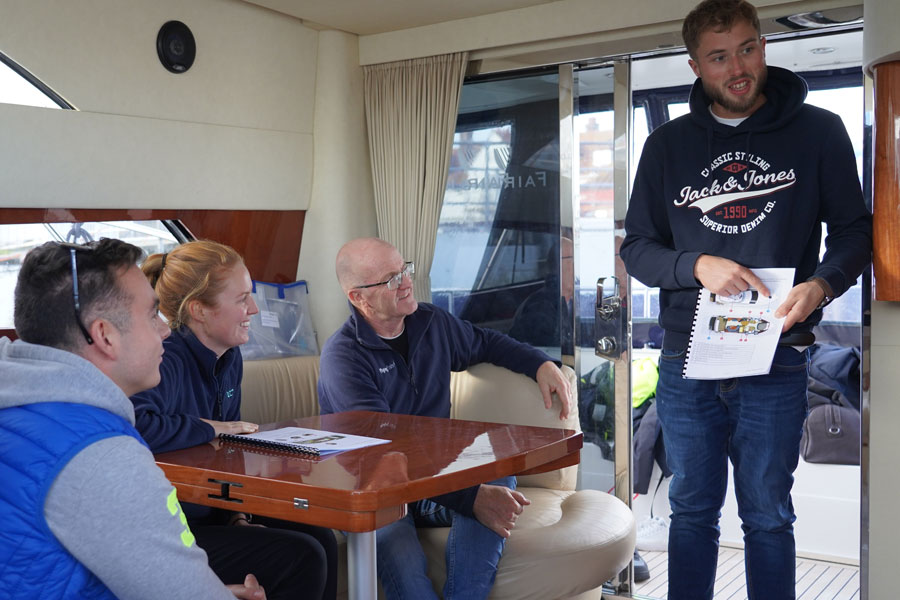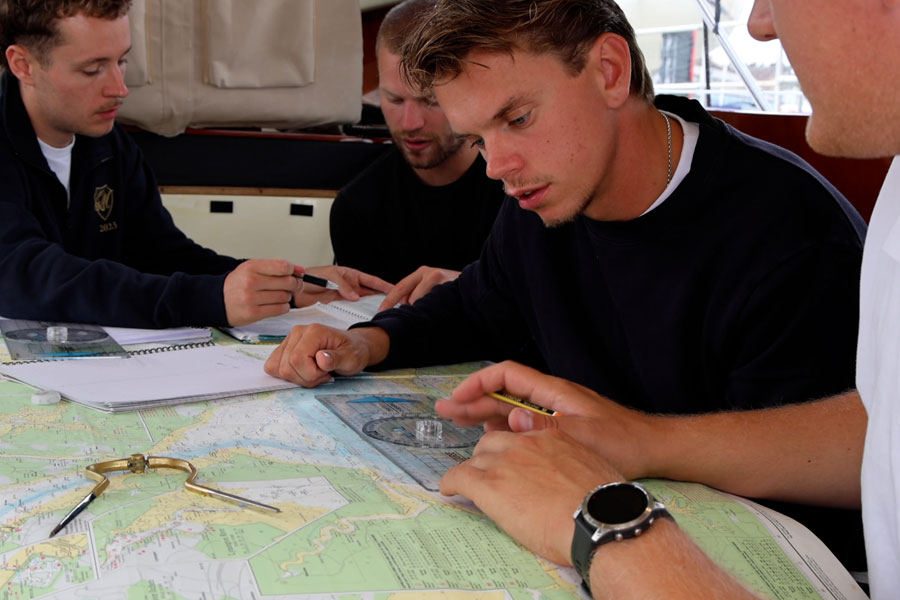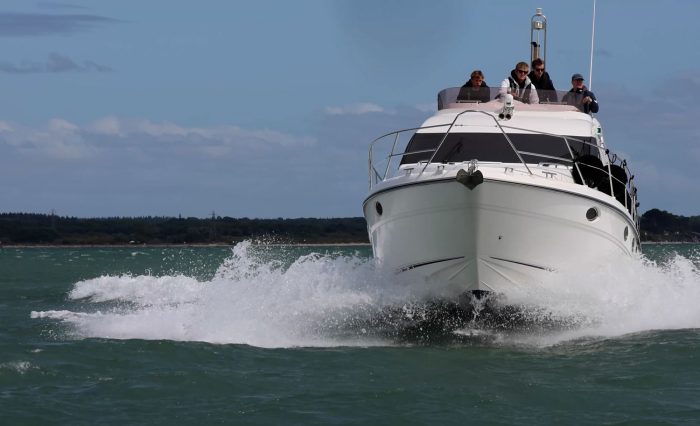For many aspiring skippers, the RYA Yachtmaster Power qualification represents a major milestone. It is a validation of your competence to take command of larger motor vessels and operate offshore with confidence. If you’re working on Superyachts, it’s the ticket you need to rise up the ranks, get that next job title and hopefully more income.
To better understand what’s required to pass the exam, we sat down with Angus Belcher, Flying Fish Instructor and experienced RYA Yachtmaster Examiner. His insights offer a picture of the expectations to achieve the qualification and also invaluable advice for preparation.
Understanding the RYA Prerequisites
Before you’re even eligible to sit the Yachtmaster Power exam, there are some essential experience-based criteria to meet. Candidates must have logged at least 2,500 nautical miles at sea, and of those, five passages need to be over 60 miles in length. Two of those passages must be conducted overnight, and two must be completed as skipper.
Alongside this sea time, you must hold a valid First Aid certificate and a Short Range VHF Radio certificate. These are non-negotiable minimums and without them, you won’t be able to progress to the exam stage.
But as Angus explains, meeting these requirements simply gets you in the door. The real challenge, and where many candidates fall short, lies in proving your competence on the water.
What the Examiner is Really Looking For
The role of the examiner is not to catch you out, but to ensure you’re capable of skippering a yacht safely and confidently.
The Yachtmaster Power qualification certifies you to take charge of vessels up to 200 gross tons, up to 150 miles offshore. That responsibility demands a high level of situational awareness, knowledge, and leadership.
At its core, the exam is a test of whether or not you can take a boat and a crew offshore and bring them back safely.

To do that, you must demonstrate an in-depth knowledge of your vessel. This means being familiar with every aspect of the boat – where the safety equipment is stored, how it works, how the engines function, and what warning signs might indicate a problem. In an emergency such as fire, flooding or engine failure, you must be able to act quickly and appropriately.
The safety briefing is not just a formality. It’s your first opportunity to demonstrate professionalism, clarity, and command. Examiners will be watching closely to see whether you can instil confidence in your crew and set a safety-first tone for the passage ahead.
Seamanship and Situational Awareness
Beyond technical knowledge, you’ll be tested on your practical seamanship skills. Can you pilot the vessel confidently through a range of conditions in wind, tide and confined spaces? Are you in full control of the yacht at all times?
Man overboard recovery is a critical component. You may be asked to demonstrate it under various simulated scenarios, and your response will be carefully assessed. Anchoring, picking up a mooring buoy, and manoeuvring in marinas or tight areas, especially under engine failure or other limitations, are all part of the evaluation.
You need to be able to make decisions under pressure, adjusting your plan in real time as the conditions change. Your ability to adapt and respond safely and calmly will make a strong impression on the examiner.
Navigation and Passage Planning
Passage planning is one of the cornerstones of the Yachtmaster Power exam. It’s not just about plotting a line on a chart, it’s about fully understanding every element that affects your route. That includes tidal streams, drying harbours, secondary ports, and the challenges you may encounter along the way.

You’ll need to be confident in calculating tidal heights and times, especially when approaching unfamiliar harbours with potential access restrictions. You should be familiar with all the essential chart symbols that relate to safety like wrecks, rocks, sandbanks and know how to apply that knowledge to your navigation.
Lighting characteristics, buoyage, and rules of the road must be second nature. Examiners want to see that you can apply COLREGs (International Regulations for Preventing Collisions at Sea) in real-life scenarios and that you understand the implications of navigational markers and signs in context, not just in theory.
Weather is another key area. You’ll be expected to interpret a marine forecast and understand the significance of terms like frontal depressions, sea breezes, land breezes and fog conditions. Crucially you should be able to relate these forecasts to your actual passage plan and decision-making process.
Why Preparation is Everything
Angus is clear on one point: you cannot overprepare for your Yachtmaster Power exam. Preparation isn’t just about checking off theoretical requirements, it’s about ensuring you feel comfortable, confident and capable on the water.
A comprehensive theory course is highly recommended. The Yachtmaster Theory syllabus is intense, but essential.
It will sharpen your navigation skills, deepen your understanding of meteorology and regulations, and solidify your confidence with charts and tidal calculations. Most importantly, it will bring all your existing knowledge together and reveal any gaps that need addressing before you step on board for the exam.
In addition to theory, a prep week on the water can make a world of difference. Getting familiar with the boat you’ll be using, running through practical drills, and simulating exam-style exercises with a qualified instructor will significantly improve your performance and reduce the nerves on the day of the assessment.
Final Thoughts
The Yachtmaster Power qualification isn’t just a certificate. It’s a statement of trust that you’re capable of taking command, managing risk, and making sound decisions in complex maritime environments.
To succeed, you need time on the water, sound navigational theory, and confidence in your ability to lead. Whether your goal is to work commercially, explore independently, or simply test your seamanship, the exam is a rewarding challenge that pushes you to be your very best.
As Angus says, the best advice is simple: know your stuff, get plenty of practice, and never underestimate the value of preparation.





